

Digital Rights Management and Books: Library Technology Reports (vol. 56, no. 1) DOI: Open Access Subscription Access Library Technology Reports (vol. 56, no. 1), “Digital Rights Management and Books,” by Mirela Roncevic Digital rights management.
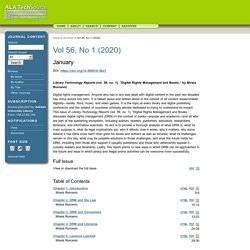
Anyone who has in any way dealt with digital content in the past two decades has come across this term. Full Issue. DRM. Digital Rights Management (DRM) technologies attempt to control what you can and can't do with the media and hardware you've purchased.

Bought an ebook from Amazon but can't read it on your ebook reader of choice? That's DRM.Bought a video game but can't play it today because the manufacturer's "authentication servers" are offline? That's DRM.Bought a smartphone but can't use the applications or the service provider you want on it? That's DRM.Bought a DVD or Blu-Ray but can't copy the video onto your portable media player? That's DRM. Corporations claim that DRM is necessary to fight copyright infringement online and keep consumers safe from viruses. DRM has proliferated thanks to the Digital Millennium Copyright Act of 1998 (DMCA), which sought to outlaw any attempt to bypass DRM. Fans shouldn't be treated like criminals, and companies shouldn't get an automatic veto over user choice and innovation. What is DRM? Digital rights management is a far-reaching term that refers to any scheme that controls access to copyrighted material using technological means.
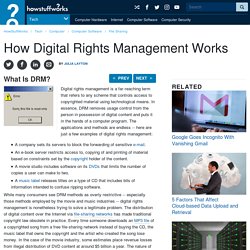
In essence, DRM removes usage control from the person in possession of digital content and puts it in the hands of a computer program. The applications and methods are endless -- here are just a few examples of digital rights management: A company sets its servers to block the forwarding of sensitive e-mail.An e-book server restricts access to, copying of and printing of material based on constraints set by the copyright holder of the content.A movie studio includes software on its DVDs that limits the number of copies a user can make to two.A music label releases titles on a type of CD that includes bits of information intended to confuse ripping software. The problem is that when you buy a DVD, it's perfectly legal for you to make a copy of it for your own use. Opening Up Reach of Libraries with Controlled Digital Lending. SPARC partnered with the Internet Archive to host a recent webinar that explored the concept of controlled digital lending – or CDL – as a strategy to expand library collections and increase accessibility.
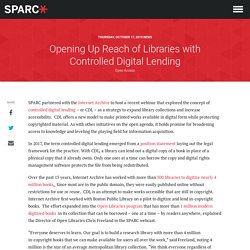
CDL offers a new model to make printed works available in digital form while protecting copyrighted material. As with other initiatives on the open agenda, it holds promise for broadening access to knowledge and leveling the playing field for information acquisition. In 2017, the term controlled digital lending emerged from a position statement laying out the legal framework for the practice. Marygrove College Library materials have been digitized and placed online, but will the courts let them stay there? When Marygrove College in Detroit made the decision to close at the end of its fall semester last year, the small Roman Catholic institution’s leaders needed to figure out what to do with its library collection.
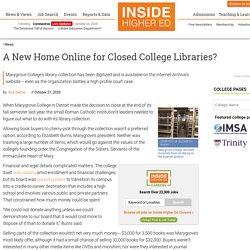
Allowing book buyers to cherry-pick through the collection wasn’t a preferred option, according to Elizabeth Burns, Marygrove’s president. Neither was trashing a large number of items, which would go against the values of the college’s founding order, the Congregation of the Sisters, Servants of the Immaculate Heart of Mary. Financial and legal details complicated matters. The college itself was closing amid enrollment and financial challenges, but its board was pursuing plans to transition its campus into a cradle-to-career destination that includes a high school and involves various public and private partners.
That constrained how much money could be spent. Library Leaders Forum Explores Impact of Controlled Digital Lending - Internet Archive Blogs. The third and final session of the 2020 Library Leaders Forum wrapped up Tuesday with a focus on the impact of Controlled Digital Lending on communities to provide broader access to knowledge.
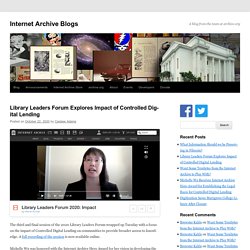
A full recording of the session is now available online. Michelle Wu was honored with the Internet Archive Hero Award for her vision in developing the legal concept behind CDL. In her remarks, the attorney and law librarian shared her thoughts on the development and future of the lending practice. Wu does not see the theory that she designed 20 years ago as revolutionary, but rather a logical application of copyright law that allows libraries to fulfill their mission. Despite current legal challenges, Wu predicts CDL can continue if libraries make themselves and their users heard. “We must make sure that the public interests served are fully described, visible and clear to lawmakers and courts at the time they make their decisions,” Wu said. (A complete profile of Wu’s work can be found here.) Controlled Digital Lending by Libraries.